
Happy Career and Technical Education (CTE) month, y’all!
Given all the changes afoot in our great state and nation, I am so glad that one thing hasn’t changed … shop class still exists!
Well, not exactly, but for those who do not know, shop class has evolved into an even more powerful way for students to build durable skills, earn credentials, explore their interests, and learn about careers in their local community.
Instead of “shop,” though, the new label is Career and Technical Education or CTE for short.
During my tenure serving as special advisor to the state superintendent on workforce engagement, one of my biggest takeaways was how scaled and robust CTE is across our state.
CTE is the backbone of our future talent pipeline.
— Kristie VanAuken
Students in North Carolina occupy nearly a million seats in CTE classrooms across our state. These students are building job skills and life skills every single day. CTE directors and career development coordinators host career fairs, build relationships with local business leaders, and offer multiple career pathways to students with all types of interests, gifts, and abilities.
Regardless of if a student chooses to pursue postsecondary education, military service, or go straight into the workforce after high school, the benefits of CTE coursework and participation in Career and Technical Student Organizations (CTSO) prepare them to tackle the big challenges while learning practical, real-world skills to take with them.
Because employers value durable and technical skills, CTE has now become a cross-partisan strategy to serve students. Governor Josh Stein issued this CTE Month proclamation, and President Donald Trump issued this CTE Month proclamation.
The mission of North Carolina secondary Career and Technical Education is to empower all students to be successful citizens, workers, and leaders in our global economy. — Governor Josh Stein
My Administration will invest in the next generation and expand access to high-quality career and technical education for all Americans. — President Donald Trump
CTE helps students determine what they would like to do after graduation, and NCCareers.org shows them the growing occupations and the education required to obtain a great job.
CTE is funded by the amended Carl D. Perkins Career and Technical Education Act of 2006 called Perkins V. This version ushered in a new era for the 100-year-old, $1.2 billion federal program.
The State of North Carolina, under the strong leadership of Trey Michael, senior director of CTE for the N.C. Department of Public Instruction (DPI), has capitalized on the opportunity to improve CTE by leveraging the increased flexibility in Perkins V to meet the unique needs of our learners, educators, and employers. Improvements include data collection and reporting, credential attainment, and local community needs assessment, among others.
For example, in the 2022-23 school year (the most recent data available), North Carolina K-12 students earned more than 325,000 credentials and grew the number of credentials earned and aligned to the North Carolina Workforce Credentials list by 44 percent. The focus on credential attainment lines up with the myFutureNC 2030 goal to have 2 million North Carolinians aged 25-44 hold an industry-valued credential or postsecondary degree by 2030.
Given the focus on credential attainment, I expect that this number will grow significantly over the next few years. That’s already happening in many places across North Carolina, including Burke County.
In addition to credential attainment, CTE students learn by doing. Learning this way is fun and active.
During my time at DPI, I visited dozens of CTE classrooms and learning labs. There is no doubt that kids love hands-on learning. From growing sweet potatoes to flying drones, welding, building boats, caring for goats, fighting fires, and building robots, these students were totally dialed in.
I also witnessed firsthand the building of durable skills found in the NC Portrait of a Graduate. There were powerful moments of collaboration, thinking critically, and personal responsibility. Where employers are having trouble finding entry level talent with these durable skills, a good starting point is placing equal value on advanced learning and CTE.
As we celebrate national CTE month this February, let us take a moment to reflect on what we want our students to know and be able to do when they graduate from high school and ask ourselves what really matters most.
Spread the word on the importance of learning practical skills and building things.
Take a moment to reflect on what you can do to grow CTE in your community — visit a CTE classroom, donate materials or sponsor events, offer job shadowing or internships, or join your district’s business advisory committee.
CTE deserves our attention and commitment this month and throughout the year. The good news is that shop class still exists, it is just better now than we could have ever imagined.



